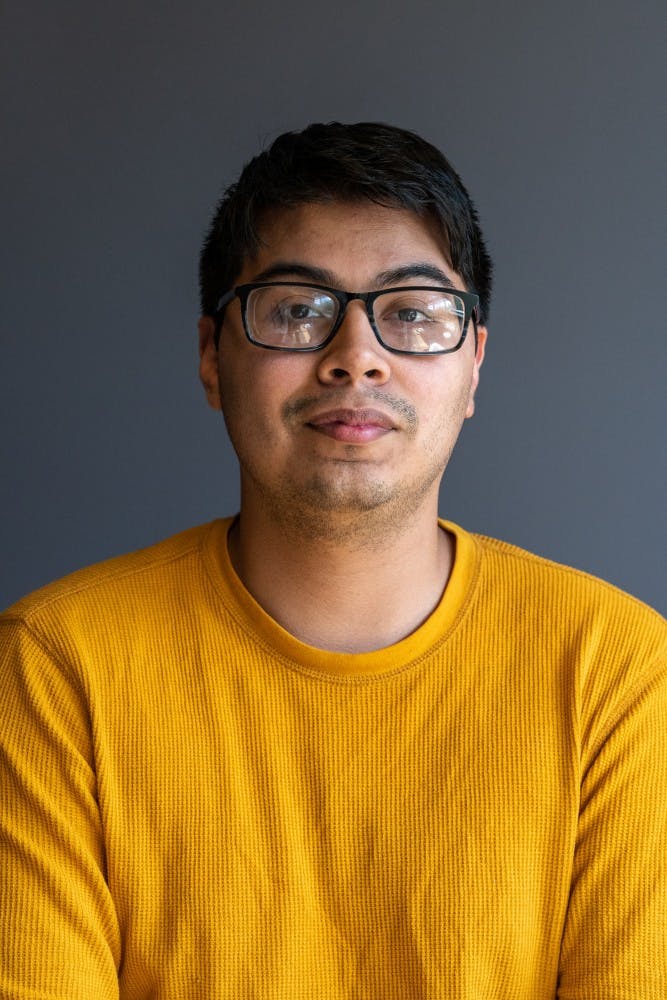
Upon being accepted to Michigan State University, I felt a sense of relief — I was accepted into a Big Ten University. As a first-generation Latinx college student, that was something exactly planned for me.

Upon being accepted to Michigan State University, I felt a sense of relief — I was accepted into a Big Ten University. As a first-generation Latinx college student, that was something exactly planned for me.
As I made the move to prepare and transition to my first year in college, I began to realize that the very institution I was accepted into and enrolled in to wasn't as diverse as it appeared to be. It was then that my journey into campus activism began, and I found myself engaged and caring for the very community that molded me into the person I am today.
It's no secret that MSU is a predominantly white institution, at least for those attending the university, that is.
I was shocked my first semester. Everything I was sold on — specifically diversity — wasn't present, and I found myself questioning whether I would fit in on campus. While I thankfully didn't struggle academically due to this, I saw a number of my hometown colleagues suffer mentally and withdraw from their studies completely.
Not a day goes by where I wonder if we were exposed to the CORES & COPS community sooner if some of them would still be on this campus.
CORES — the Council of Racial and Ethnic Students — and COPS — the Council of Progressive Students — often go unrecognized. Yet, they continue to do the work they do and, most importantly, provide an invaluable service for students here at MSU. And that is community.
I found myself specifically involved in CORES within the organization Culturas De Las Razas Unidas, or CRU, where I began to take more pride in my upbringing. I discovered I was able connect on a more direct level with students through this.
Plenty of us there are first-generation college students, harboring similar struggles regarding our families and loved ones. It was eye-opening for me to be able to see such a heartwarming community thriving and interacting. I was more frustrated with myself, though, because it took me an entire year to find the very community I identified and connected with on this campus.
Harboring that frustration and thinking about how a year without a community kept me isolated on this campus, I decided to run for an e-board position as the Associated Students of Michigan State University, or ASMSU, representative. Through this, I was able to voice Latinx concerns and struggles to the greater MSU community.
I served in that position for two years, where I continuously challenged my colleagues in ASMSU and my very own organization in CRU to think about how diverse and inclusive they are being within the greater MSU and Latinx community on campus.
While I enjoyed my time serving as the ASMSU representative, I made a daring move to shift from that position as a representative to run for the president position within CRU. Successful in my run for the position, I was eager and excited to see the changes and perspective I could bring to the Latinx community. I wasn't aware yet about the mental and physical toll this would take on me.
CORES consists of four organizations, which are the Black Students Alliance, or BSA, CRU, the Native American Indigenous Student Organization, or NAISO, and the Asian Pacific American Student Organization, or APASO. These groups actively work to advocate and bring concerns to the MSU administration.
Each respective organization has its own e-board ranging in positions from president to secretary.
Currently, I serve as the president of CRU, and I'm passionate about the community I represent and work endlessly to bring to light the issues I know they undergo. But it would be wrong of me to not include the strain these tasks have on me and on my e-board.
Much of the programing revolving around marginalized communities fall under our responsibility, not the university's.
Many of the large events that occur within our organizations are provided by passionate students who don't get paid and want nothing but the best for their communities. The list of events that happened this semester for our very own communities are, for instance, the Black Power Rally, The Day of the Dead Celebration, The Indigenous Peoples Day March and Commemoration and the Winter Pageant. Most of these events bring in more than 300 attendees and bring together students and communities who otherwise wouldn't interact.
These events bring a dynamic to each of our lives, as activists and as students.
I work to pay my bills and eat and study so that, down the line, I earn a degree. However, if I don't focus on my community, then I fear many students will lack what made me grow on this campus.
This work is satisfying. I get to see students, like myself, shine and be their authentic selves.
Support student media! Please consider donating to The State News and help fund the future of journalism.
The work CORES & COPS does is invaluable, and while the relationship isn't the best with administration at the moment, I can't help but feel happy when I see the next generation as passionate and ready to continue to build a more inclusive and diverse campus.
Like I said, most of the diverse programming done on this campus is done by passionate and driven students.
Looking back, I was given a speech on diversity at MSU for business, and my enrollment was expected in return. While it may have worked, I'm happy to see that students here are able to run these diverse programs out of their kindness and passion, which is something you don't see often.